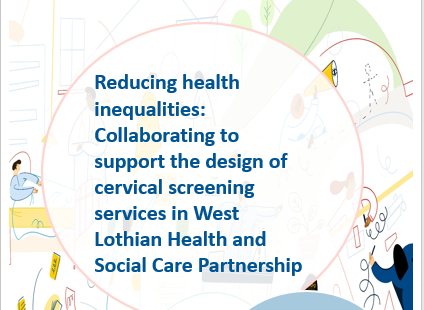

Back in 2017 (yes, it does seem a lifetime ago!) I was invited to speak at a conference to share my thoughts about engaging the whole health and social care workforce with the principles underpinning Realistic Medicine, and how we create conditions for innovation across the social care sector.
The presentation focused on my experiences of working with social care organisations across the third, independent and statutory sectors and how I am constantly inspired by the innovative and entrepreneurial spirit that exists across the social care workforce. I spoke of individuals and teams I have worked with who exude professionalism, creativity, bravery and have the appetite – and skills – to enable people they support to live their best life.
Never have these attributes been more evident than during our programme – funded by the CMO Realistic Medicine Team – which has sought to positively address unwanted variation and differences in the uptake of bowel and cervical cancer screening programmes across two Health and Social Care Partnerships (HSPCs).
There is significant variation in uptake of screening between the least and most deprived communities in Scotland. Reasons for non-participation in screening programmes – and early intervention and prevention programmes more generally – are complex. These include: a lack of understanding and trust, fear, conflicting life priorities and challenges regarding accessibility of services.
Our programme aims to help reduce health inequalities by removing the barriers to participation through better use and sharing of granular, locality-based screening participation data. In effect we are looking at screening intelligence through a ‘social care lens’, exploring how we can optimise the potential of existing NHS territorial and specialist board teams and capabilities across the health and social care integrated landscape to better support people invited to participate in screening programmes to make informed choices.
This has required us to better understand integrated operational systems and organisational priorities and think about how we might re-organise screening data for strategic planning teams and primary care services across HSCPs. Through this co-designed programme we are building the potential for data-informed evidence-based screening services and laying the foundations for greater use of predictive analytics across communities, existing social care service and third sector programmes, HSCPs and NHS Boards across Scotland.
Our service design journey used the Scottish Approach to Service Design (SAtSD). We ran a series of four workshops for West Lothian HSCP and North Lanarkshire HSCP and organised numerous focus groups and one-to-one meetings; ensuring our research and design process was inclusive, accessible and everybody could participate fully, and in a meaningful way. The ‘Double Diamond’ model used ensured we understood the problems before designing solutions. Some of the outcomes to date are as follows:
More resources and learning can be found in the learning toolkit we have developed.
This project has identified opportunities for HSCPs and NHS screening services to personalise interactions and optimise the potential of local resources, systems, touchpoints, and organisations more effectively through accessible, community intelligence that is both useful and relevant.
We believe this approach also has the potential to support the current thinking regarding how we modernise our approach to health care – designing and funding interventions which support prevention, early intervention, and a healthier Scotland. We are currently in the process of actively sharing our learning with colleagues across health and social care.
It is also creating opportunities for HSCPs, Health Boards and communities to work more closely to collectively address screening inequalities, and health inequalities more broadly. We anticipate that the learning from this programme will support the Scottish Equity in Screening Strategy 2023 – 2026 launched by the Scottish Government and the NSS National Screening Oversight (NSO) Team on the 27th July 2023.
We are enabling Value Based Health Care across social care and community systems – using resources in the best way to have the biggest impact across the population who need our help the most. We believe that learning from this programme can support a range of early intervention and prevention programmes designed to support more sustainable health and social care services.
I would like to leave you with this thought:
‘If you cannot find solutions in the usual places go to the unusual places’
